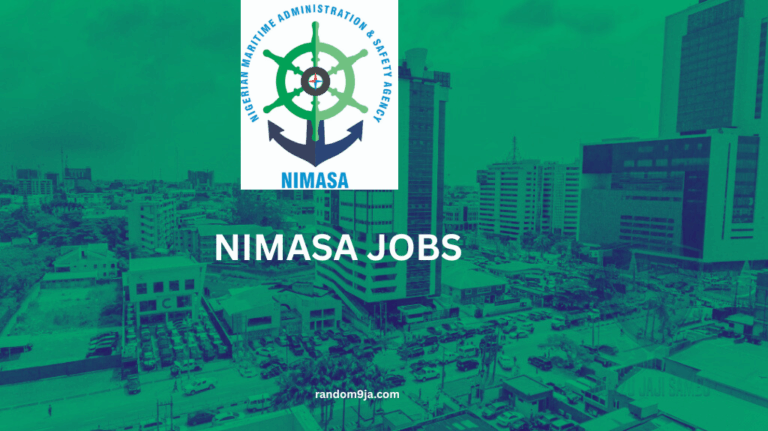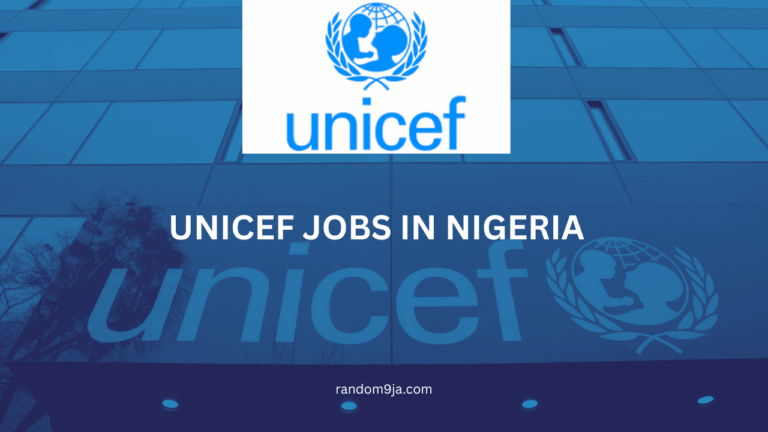WHO Jobs in Nigeria 2026 – Apply Now
 If you are passionate about contributing to global health, policy development, epidemiology, humanitarian work, data science, or community health, then WHO offers some of the most impactful and competitive career possibilities in the world. This comprehensive guide dives deep into WHO Jobs in Nigeria 2026, the recruitment processes, and tips to position yourself as a compelling candidate.
If you are passionate about contributing to global health, policy development, epidemiology, humanitarian work, data science, or community health, then WHO offers some of the most impactful and competitive career possibilities in the world. This comprehensive guide dives deep into WHO Jobs in Nigeria 2026, the recruitment processes, and tips to position yourself as a compelling candidate.
WHO Jobs in Nigeria Are Highly Sought After
Working with the World Health Organization comes with exceptional professional and humanitarian benefits. WHO is committed to helping countries strengthen their health systems, combat epidemics, improve maternal and child health, and contribute to long-term public health reforms.
Key Reasons Nigerians Aim for WHO Careers
1. Global Recognition and Credibility
A job with WHO instantly elevates your professional profile, opening international career doors.
2. Competitive Salary and Benefits
WHO salaries are significantly above national averages, especially for international-level positions.
3. Impactful Work
You directly contribute to health programs that save lives and transform communities.
4. Multicultural Working Environment
WHO teams are diverse, welcoming experts from various cultural and academic backgrounds.
5. Opportunities for International Travel
Depending on your role, you may travel locally and internationally for conferences, field missions, and capacity development.
6. Professional Development Opportunities
WHO regularly offers training programs, certifications, leadership courses, and research opportunities.
WHO’s Presence and Activities in Nigeria
The WHO Country Office in Nigeria is one of the organization’s busiest operations in Africa. It collaborates with Nigeria’s Federal Ministry of Health and partners to deliver:
-
Immunization programs
-
Polio eradication efforts
-
Outbreak response (Lassa fever, cholera, measles, etc.)
-
Health emergency preparedness
-
Maternal and child health projects
-
Health system strengthening
-
Public health data surveillance
-
Nutrition improvement programs
-
WHO Disease Surveillance and Response Systems (IDSR)
Because of these ongoing activities, WHO frequently recruits skilled Nigerians, consultants, interns, and international experts.
Types of WHO Jobs Available in Nigeria (2026)
WHO roles cut across technical, administrative, scientific, and support fields. Here are common categories expected to be in demand in 2026:
1. Public Health & Epidemiology Roles
These positions are core to WHO’s mission to prevent, detect, and respond to health threats.
Common positions include:
-
Epidemiologist
-
Public Health Officer
-
Immunization Specialist
-
Surveillance Officer
-
Laboratory Scientist
-
Disease Prevention Specialist
-
Field Epidemiology Specialist
These roles often involve field missions, data collection, and collaboration with health ministries.
2. Health Emergency & Humanitarian Response Roles
Nigeria experiences frequent health emergencies, including outbreaks and humanitarian challenges in conflict-affected regions.
Typical roles:
-
Emergency Response Coordinator
-
Health Cluster Coordinator
-
Health Emergency Officer
-
Outbreak Investigation Specialist
-
Risk Communication Specialist
These jobs require ability to work in challenging environments and rapid-response situations.
3. Medical & Clinical Roles
These positions are for trained medical professionals.
Examples include:
-
Medical Officer
-
Nutrition Officer
-
Maternal and Child Health Specialist
-
Immunization Medical Consultant
-
Health Facility Supervisor
Many of these require advanced clinical training and experience in public health programs.
4. Data, Research & Analysis Roles
Data-driven decision making is at the core of WHO operations.
Relevant job titles include:
-
Data Analyst
-
Health Information Systems (HIS) Officer
-
Research Analyst
-
Monitoring & Evaluation (M&E) Specialist
-
Data Quality Assurance Officer
-
Biostatistician
Strong analytics, Excel, SPSS, R, or Python skills are highly valued.
5. Administration, Finance & Operations
WHO also recruits non-medical professionals to support organizational operations.
Common roles include:
-
HR Assistant
-
Finance Officer
-
Logistics & Supply Chain Manager
-
Procurement Specialist
-
Administrative Clerk
-
Communications Officer
These positions ensure smooth running of WHO offices and field activities.
6. ICT & Digital Health Positions
WHO is increasingly leveraging digital solutions for health monitoring and reporting.
Relevant roles include:
-
IT Support Specialist
-
Cybersecurity Analyst
-
GIS Mapping Specialist
-
Digital Health Officer
-
Database Manager
Candidates with tech skills have a growing advantage.
7. Internships and Short-Term Consultancies
WHO Nigeria often hires:
-
Interns
-
Research fellows
-
National consultants
-
Independent contractors
These short-term contracts sometimes lead to long-term positions.
Qualifications Required for WHO Jobs in Nigeria (2026)
WHO maintains strict hiring standards to ensure the highest level of expertise.
Educational Requirements
Depending on the position:
-
Bachelor’s degree required for junior roles
-
Master’s degree preferred in public health, epidemiology, medicine, statistics, nursing, environmental science, social sciences, health economics, or related fields
-
Medical degree (MBBS/MD) for clinical roles
-
PhD considered an advantage for scientific and research roles
Professional Experience
Typical experience requirements include:
-
Entry-level: 1–3 years
-
Mid-level roles: 4–7 years
-
Senior roles: 8–12+ years
-
Consultant roles: Expert-level proficiency
Technical Skills
WHO often seeks candidates with:
-
Strong understanding of Nigeria’s health system
-
Familiarity with global health standards
-
Proficiency in data analysis tools
-
Ability to work in tough field environments
-
Excellent reporting and documentation skills
For technical roles:
-
Knowledge of SPSS, STATA, R, Power BI, GIS tools, or KOBO Collect
-
Experience in outbreak management
-
Strong epidemiological skills
Soft Skills
WHO values:
-
Communication
-
Teamwork
-
Cultural sensitivity
-
Problem-solving
-
Adaptability
-
Leadership
How to Apply for WHO Jobs in Nigeria 2026: Step-by-Step Guide
Applying for WHO jobs is highly competitive. Follow these steps to stand out.
Step 1: Visit the WHO Careers Portal
All WHO job openings worldwide are listed on the official recruitment portal.
Use search filters such as:
-
Location: Nigeria
-
Job type: Fixed-term, temporary, internships
-
Job field: Health, administration, research
Step 2: Create an Online Profile
You must register an account before submitting applications.
Step 3: Prepare a Strong CV and Cover Letter
Your application should highlight:
-
Relevant experience
-
Achievements with measurable impact
-
Technical skills
-
Field exposure (if applicable)
-
Public health or humanitarian experience
Customized applications always perform better.
Step 4: Submit Application and Required Documentation
Upload CV, certificates, and any requested documents.
Step 5: Prepare for WHO Assessments
The hiring process usually includes:
-
Written tests
-
Scenario-based questions
-
Technical interviews
-
Competency-based assessments
Step 6: Final Interview & Selection
If successful, WHO notifies you through email and begins onboarding.
WHO Salary Structure in Nigeria (2026)
WHO uses a structured pay scale based on job grade and experience. Below is an estimated range:
1. National Staff (Nigerian Hires)
| Job Level | Estimated Monthly Salary (₦) |
|---|---|
| Support/Assistant roles | ₦350,000 – ₦650,000 |
| Officer-level positions | ₦700,000 – ₦1,500,000 |
| Specialist/Technical officers | ₦1,600,000 – ₦3,500,000 |
| National consultants | ₦4,000,000 – ₦8,000,000 |
2. International Staff (Global WHO Employees)
Paid in USD or Euros.
| Job Type | Estimated Monthly Salary |
|---|---|
| Mid-level international staff | $4,000 – $9,000 |
| Senior WHO technical experts | $10,000 – $18,000 |
| Director-level positions | $20,000+ |
These packages often include relocation benefits, health insurance, travel allowances, and pension packages.
Top Skills Nigerians Need to Secure WHO Jobs in 2026
1. Epidemiology & Disease Surveillance
Thousands apply for WHO jobs, but only few have field-level experience.
2. Data Management & Analytics
Data is the core of WHO’s public health interventions.
3. Monitoring & Evaluation (M&E)
NGOs and UN agencies value strong M&E professionals.
4. Community Engagement Skills
Essential for vaccination campaigns, outbreak responses, and social mobilization.
5. Emergency & Humanitarian Response Skills
Nigeria faces recurring emergencies, increasing demand for expertise.
6. Strong Reporting Skills
WHO emphasizes accurate, clear, and timely documentation.
Challenges Applicants Face & How to Overcome Them
1. Weak CV Formatting
Solution: Use a WHO-standard resume style—clear, concise, and achievement-focused.
2. Lack of Field Experience
Solution: Volunteer with local NGOs or state health programs.
3. Poor Cover Letters
Solution: Tailor each letter to the job role and highlight relevant achievements.
4. Missing Certifications
Solution: Take short courses in:
-
Epidemiology
-
Data analysis
-
M&E
-
Public health management
What WHO Will Likely Focus on Beyond 2026
-
More digital health roles
-
Stronger focus on climate-related health issues
-
Expanded disease surveillance systems
-
Boosted humanitarian and emergency response personnel
-
Greater reliance on public health data analysts
-
Increased opportunities for Nigerian health professional
Read Also: Remote/NGO Opportunities 2026 for Nigerians
Working with the World Health Organization is not only a prestigious career path but also an opportunity to make a profound impact on Nigeria’s public health sector. With jobs ranging from epidemiology and medicine to administration and logistics, there’s a position for almost every type of professional.
To secure a WHO job in Nigeria for 2026, you must prepare early—sharpen your skills, gain field experience, tailor your application documents, and monitor the WHO careers portal regularly.





